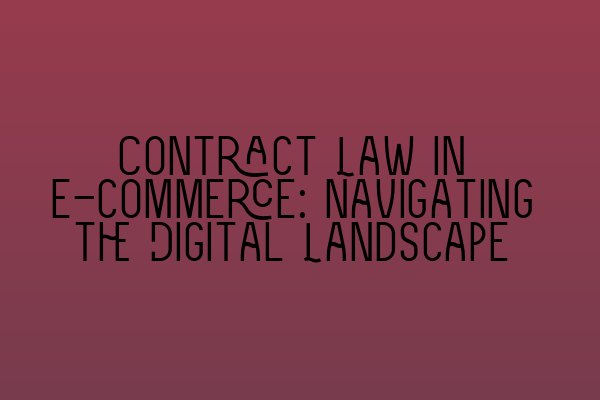Contract Law in E-commerce: Navigating the Digital Landscape
Welcome to our blog post on contract law in the evolving world of e-commerce. In today’s digital age, online transactions have become increasingly prevalent, making it essential for businesses to understand the legal implications of engaging in e-commerce. In this article, we will explore the key aspects of contract law that apply to e-commerce and provide you with valuable insights on how to navigate the digital landscape effectively.
The Formation of Contracts in E-commerce
When engaging in e-commerce, it is crucial for businesses to ensure that the contracts formed are legally enforceable. In traditional brick-and-mortar transactions, contracts are typically formed through face-to-face negotiations or the exchange of physical documents. However, in the digital world, contracts can be formed through online agreements, terms and conditions, or even by simply clicking on a button.
One area of contract law that is particularly pertinent to e-commerce is the issue of offer and acceptance. In order for a contract to be valid, there must be a clear offer made by one party and an unequivocal acceptance of that offer by the other party. This can sometimes be more challenging to determine in the context of online transactions, where offers and acceptances may be made through electronic means.
For a comprehensive understanding of offer and acceptance in contract law, we recommend reviewing our article on offer and acceptance in contracts.
The Importance of Terms and Conditions
Terms and conditions play a vital role in e-commerce transactions. They serve as the governing rules of the contract, specifying the rights and obligations of the parties involved. It is crucial for businesses to draft clear and comprehensive terms and conditions that protect their interests and comply with applicable laws and regulations. Failure to do so may leave businesses exposed to legal risks and potential disputes.
When drafting terms and conditions for your e-commerce business, it is important to consider various factors, including consumer protection laws, data privacy regulations, and industry-specific requirements. For expert guidance on drafting effective terms and conditions, you may find our article on the essentials of effective terms and conditions useful.
Electronic Signatures in E-commerce
Electronic signatures have gained widespread acceptance as a valid form of signing contracts in the digital era. They provide businesses with a convenient and efficient way to obtain signatures from their customers or contractors without the need for physical documents. However, it is crucial to ensure that your e-commerce business adheres to the legal requirements for valid electronic signatures.
Understanding the legal framework surrounding electronic signatures can be complex. To help you navigate this area of contract law effectively, we recommend reading our article on electronic signatures and their legal validity.
Dispute Resolution in E-commerce
While businesses strive to establish solid contracts and maintain positive relationships with their customers, disputes can still arise in the world of e-commerce. When disputes occur, it is essential to have a robust dispute resolution mechanism in place to ensure fair and efficient resolution.
There are various dispute resolution options available for e-commerce businesses, including negotiation, mediation, and arbitration. The choice of method will depend on the nature of the dispute and the preferences of the parties involved. For a detailed overview of dispute resolution options in e-commerce, please refer to our article on efficient dispute resolution in e-commerce.
Conclusion
E-commerce has revolutionized the way businesses operate and engage with customers. Understanding the legal aspects of contract law in the digital landscape is essential for any e-commerce business to thrive and avoid potential legal pitfalls. By familiarizing yourself with the formation of contracts, terms and conditions, electronic signatures, and dispute resolution options, you can navigate the world of e-commerce with confidence.
For more information on preparing for the SQE exams and enhancing your knowledge of contract law, check out our SQE preparation courses. Stay ahead of the game and ensure your success in mastering the complexities of contract law in e-commerce.
